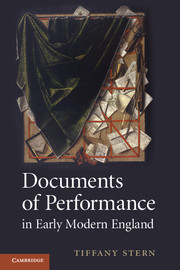Book contents
- Frontmatter
- Contents
- Acknowledgements
- Textual note
- Introduction: Playwrights as play-patchers
- 1 Plot-scenarios
- 2 Playbills and title-pages
- 3 ‘Arguments’ in playhouse and book
- 4 Prologues, epilogues, interim entertainments
- 5 Songs and masques
- 6 Scrolls
- 7 Backstage-plots
- 8 The approved ‘book’ and actors' parts
- Conclusion: Repatching the play
- Notes
- Bibliography
- Index
1 - Plot-scenarios
Published online by Cambridge University Press: 18 December 2009
- Frontmatter
- Contents
- Acknowledgements
- Textual note
- Introduction: Playwrights as play-patchers
- 1 Plot-scenarios
- 2 Playbills and title-pages
- 3 ‘Arguments’ in playhouse and book
- 4 Prologues, epilogues, interim entertainments
- 5 Songs and masques
- 6 Scrolls
- 7 Backstage-plots
- 8 The approved ‘book’ and actors' parts
- Conclusion: Repatching the play
- Notes
- Bibliography
- Index
Summary
INTRODUCTION
Abraham Wright, the divine, had performed in plays when at Oxford in the 1630s; he had even written a play, The Reformation, now lost, that had been acted with some success. So when, in around 1640, he started taking notes about the plays he was studying, he did so as an afficionado. He realised, for instance, that lines might read poorly on the page but act well, saying of Vittoria Corombona (John Webster's White Devil) that it was ‘indifferent’ as a text, ‘but for ye presentments I beeleeve good’, and of Henry Shirley's Martyrd Souldier that its songs had been ‘much taken’ by the ‘people’, though it too had, to his mind, second-rate lines. Wright's method was to analyse plays for two features both of which he commented on separately. One was the writing style. The other was the ‘plot’. Thus there were plays like James Shirley's School of Complement that Wright found to be ‘a good play for ye plot rather then lines’; and there were plays like The Lady of Pleasure, also by Shirley, that Wright thought ‘ye best play … for ye lines’, whilst finding ‘ye plot is as much as none’. Ideally the play should be strong in both, like Shakespeare's Othello which was ‘A very good play, both for lines and plot, but especially ye plot’.
Wright's notes are accompanied by excerpted passages from plays, often paraphrased, to be learnt and reused.
- Type
- Chapter
- Information
- Documents of Performance in Early Modern England , pp. 8 - 35Publisher: Cambridge University PressPrint publication year: 2009



